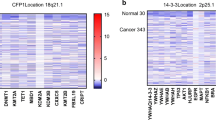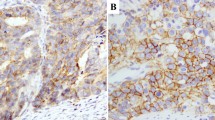Abstract
The cytoplasmic enzyme dihydrodiol dehydrogenase (DDH) plays an important role in detoxification. Patients with DDH overexpression have a significantly higher incidence of early tumor recurrence and distant metastasis. This study evaluated the correlation between clinicopathological data and DDH expression and the prognostic significance of DDH expression in patients with resected gastric cancer. Between January 1998 and September 2004, we retrospectively enrolled 81 patients who received surgical treatment for gastric cancer. Pathology samples were immunostained with monoclonal antibody to DDH. The relationship between DDH expression and clinicopathological data (age, gender, histological type, stage) was analyzed by chi-square analysis. Survival curves were plotted using the Kaplan–Meier method and compared using a log-rank test. The overexpression rate of DDH was 41.9%. Of patients with overexpressed DDH, 13% had stage I, 24% had stage II, 52% had stage III, and 78% had stage IV tumors. Among patients who died, DDH expression level differed significantly between high and low-expression groups (P = 0.042). Survival was significantly better in patients with low DDH expression (P = 0.048). Thus, DDH expression may be useful in identifying high-risk gastric cancer patients and distinguishing future candidates for curative and palliative treatment.


Similar content being viewed by others
Abbreviations
- DDH:
-
Dihydrodiol dehydrogenase
- PAH:
-
Polycyclic aromatic hydrocarbons
References
Brennan MF (2005) Current status of surgery for gastric cancer: a review. Gastric Cancer 8:64–70. doi:10.1007/s10120-005-0319-6
Desai AM, Pareek M, Nightingale PG, Fielding JW (2004) Improving outcomes in gastric cancer over 20 years. Gastric Cancer 7:196–201. doi:10.1007/s10120-004-0289-0 discussion 201–203
Vidal O, Soriano-Izquierdo A, Pera M, Elizalde JI et al (2008) Positive VEGF immunostaining independently predicts poor prognosis in curatively resected gastric cancer patients: results of a study assessing a panel of angiogenic markers. J Gastrointest Surg 12:1005–1014. Epub 2007 Oct 31
Kato K, Iida S, Uetake H et al (2008) Methylated TMS1 and DAPK genes predict prognosis and response to chemotherapy in gastric cancer. Int J Cancer 122:603–608
Nomura Y, Takasaki K, Tada M et al (2007) Pro-MMP-9 is associated with poor prognosis in gastric cancer. Scand J Gastroenterol 42:1070–1072. doi:10.1080/00365520701435881
Galizia G, Lieto E, Orditura M et al (2007) Epidermal growth factor receptor (EGFR) expression is associated with a worse prognosis in gastric cancer patients undergoing curative surgery. World J Surg 31:1458–1468. doi:10.1007/s00268-007-9016-4
Sumiyoshi Y, Kakeji Y, Egashira A et al (2006) Overexpression of hypoxia-inducible factor 1alpha and p53 is a marker for an unfavorable prognosis in gastric cancer. Clin Cancer Res 12:5112–5117. doi:10.1158/1078-0432.CCR-05-2382
Chen CY, Hsu CP, Hsu NY et al (2002) Expression of dihydrodiol dehydrogenase in the resected stage I non-small cell lung cancer. Oncol Rep 9:515–519
Yang MD, Wu CC, Chiou SH et al (2003) Reduction of dihydrodiol dehydrogenase expression in resected hepatocellular carcinoma. Oncol Rep 10:271–276
Deng HB, Parekh HK, Chow KC, Simpkins H (2002) Increased expression of dihydrodiol dehydrogenase induces resistance to cisplatin in human ovarian carcinoma cells. J Biol Chem 277:15035–15043. doi:10.1074/jbc.M112028200
Klein J, Thomas H, Post K et al (1992) Dihydrodiol dehydrogenase activities of rabbit liver are associated with hydroxysteroid dehydrogenases and aldo-keto reductases. Eur J Biochem 205:1155–1162. doi:10.1111/j.1432-1033.1992.tb16885.x
Burczynski ME, Harvey RG, Penning TM (1998) Expression and characterization of four recombinant human dihydrodiol dehydrogenase isoforms: oxidation of trans-7, 8-dihydroxy-7, 8-dihydrobenzo[a]pyrene to the activated o-quinone metabolite benzo[a]pyrene-7, 8-dione. Biochemistry 37:6781–6790. doi:10.1021/bi972725u
Lin TS, Chiou SH, Wang LS et al (2004) Expression spectra of matrix metalloproteinases in metastatic non-small cell lung cancer. Oncol Rep 12:717–723
Hsu NY, Ho HC, Chow KC et al (2001) Overexpression of dihydrodiol dehydrogenase as a prognostic marker of non-small cell lung cancer. Cancer Res 61:2727–2731
Wang LS, Chow KC, Wu YC et al (2004) Inverse expression of dihydrodiol dehydrogenase and glutathione-S-transferase in patients with esophageal squamous cell carcinoma. Int J Cancer 111:246–251. doi:10.1002/ijc.11650
Chen YJ, Yuan CC, Chow KC et al (2005) Overexpression of dihydrodiol dehydrogenase is associated with cisplatin-based chemotherapy resistance in ovarian cancer patients. Gynecol Oncol 97:110–117. doi:10.1016/j.ygyno.2004.12.031
Deng HB, Adikari M, Parekh HK, Simpkins H (2004) Ubiquitous induction of resistance to platinum drugs in human ovarian, cervical, germ-cell and lung carcinoma tumor cells overexpressing isoforms 1 and 2 of dihydrodiol dehydrogenase. Cancer Chemother Pharmacol 54:301–307. doi:10.1007/s00280-004-0815-0
Klein J, Post K, Seidel A et al (1992) Quinone reduction and redox cycling catalysed by purified rat liver dihydrodiol/3 alpha-hydroxysteroid dehydrogenase. Biochem Pharmacol 44:341–349. doi:10.1016/0006-2952(92) 90018-E
Penning TM (1993) Dihydrodiol dehydrogenase and its role in polycyclic aromatic hydrocarbon metabolism. Chem Biol Interact 89:1–34. doi:10.1016/0009-2797(93) 03203-7
Author information
Authors and Affiliations
Corresponding author
Rights and permissions
About this article
Cite this article
Chang, HC., Chen, YL., Chan, CP. et al. Overexpression of Dihydrodiol Dehydrogenase as a Prognostic Marker in Resected Gastric Cancer Patients. Dig Dis Sci 54, 342–347 (2009). https://doi.org/10.1007/s10620-008-0350-7
Received:
Accepted:
Published:
Issue Date:
DOI: https://doi.org/10.1007/s10620-008-0350-7




